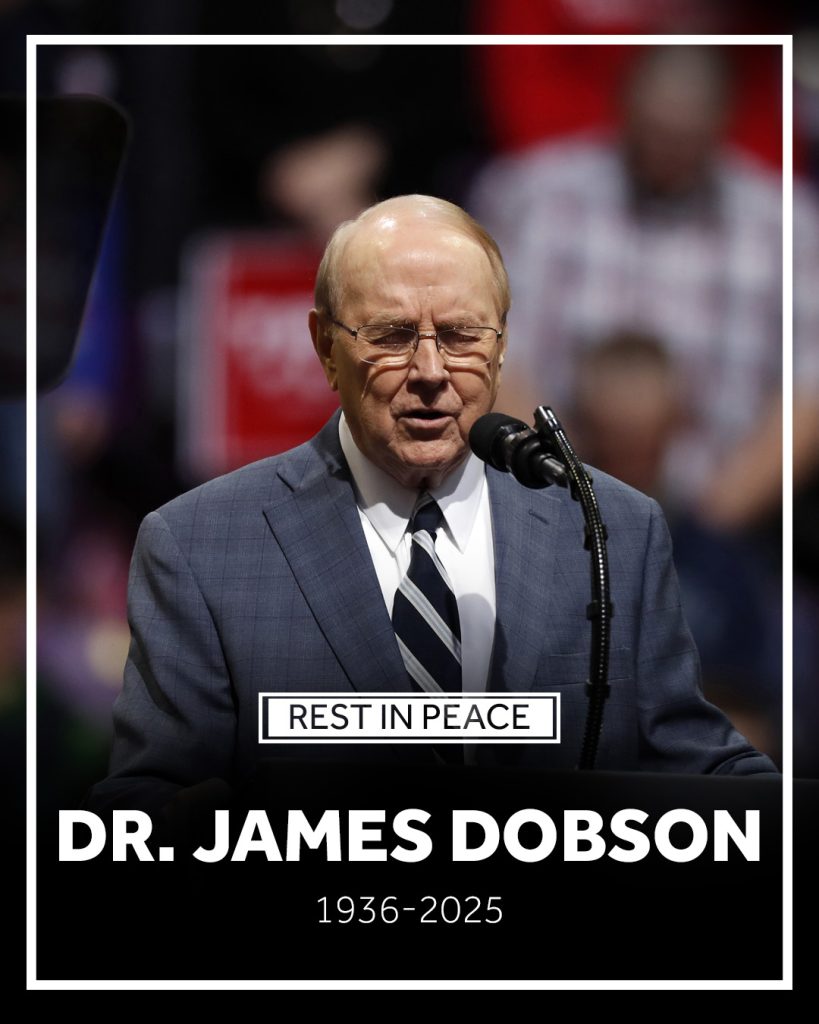James Dobson, the child psychologist who became one of the most influential voices in American conservative Christianity, has passed away at the age of 89. His death, confirmed on Thursday by the Dr. James Dobson Family Institute, marks the end of a chapter in modern evangelical history. Dobson’s life was one of both deep faith and political influence, a combination that shaped the lives of millions of American families and left an indelible mark on the nation’s cultural and political landscape.

Born in Shreveport, Louisiana, in 1936, Dobson came of age in a deeply religious family that placed a strong emphasis on faith and moral values. He studied psychology and earned his doctorate, becoming a child psychologist who quickly rose to prominence not only in professional circles but also in faith communities. His early career focused on counseling Christians about how to raise children with discipline, love, and biblical principles. This commitment to strengthening the family soon led him to launch a small radio program that would become the foundation of his lifelong mission.
In 1977, Dobson founded Focus on the Family, a nonprofit ministry that would grow into a powerhouse in both religious and political life. At its peak, the organization employed more than 1,000 people and reached millions of households across the country. Through books, lectures, and especially radio broadcasts, Dobson became a trusted voice in American homes, offering guidance on marriage, parenting, and moral choices. Focus on the Family also became a platform for Dobson to address national issues, shaping debates on abortion, LGBTQ+ rights, and education policy.
By the 1980s, Dobson had become a central figure in the rise of the Christian right, standing alongside leaders such as Jerry Falwell and Pat Robertson. He encouraged religious conservatives to step into the political arena, transforming them into a decisive force within the Republican Party. In 1989, Falwell even described Dobson as a “rising star,” highlighting his growing influence. Decades later, that influence remained evident when Dobson joined an advisory board of evangelical leaders supporting Donald Trump in his 2016 presidential campaign. He would go on to support Trump in all three of his bids for the presidency, praising the former president’s conservative judicial appointments that eventually led to the overturning of Roe v. Wade in 2022.
For Dobson, that decision was a crowning achievement in the movement he had helped build. On one of his ministry broadcasts, he declared, “Whether you like Donald Trump or not, whether you supported or voted for him or not, if you are supportive of this Dobbs decision that struck down Roe v. Wade, you have to mention in the same breath the man who made it possible.” Such statements reflected both Dobson’s political convictions and his willingness to speak directly about the figures he believed advanced his causes.
Dobson formally stepped down from Focus on the Family in 2010, but his work did not end there. He established the Dr. James Dobson Family Institute and continued to reach audiences through his Family Talk radio program. According to the institute, the show is now carried by 1,500 radio outlets, reaching more than half a million listeners each week. His family, in announcing his death, wrote: “Dr. Dobson’s impact endures through the many lives he touched, the families he strengthened, and the unshakable faith he proclaimed.”
Throughout his career, Dobson often brought national figures onto his programs. In 1985, he interviewed President Ronald Reagan in the Oval Office, praising him for focusing on family-centered policies. His shows also featured testimonies from people who claimed they had left behind homosexuality after embracing Christianity, reflecting his ministry’s conservative stance on LGBTQ+ issues.
Dobson was more than a broadcaster; he was also a mentor to the next generation of Christian conservative leaders. Tony Perkins, president of the Family Research Council, recalled how Dobson had once approached him to lead the organization when Perkins was still a Louisiana legislator. Perkins, who grew up watching Dobson’s films and listening to his teachings, later described Dobson as a figure who deserved a place on the “Mount Rushmore” of Christian conservatism. “Very few people have had such a positive impact in the shaping of the American family from a biblical standpoint,” Perkins said, adding that Dobson’s legacy would continue to inspire even after his passing.
Dobson’s national profile was so strong that in the late 1990s, there was serious speculation he might run for president. Ralph Reed, founder of the Faith and Freedom Coalition, remembered that Dobson “had a big audience. He was not afraid to speak out. He became a very important voice, and there was even talk that he might run for president. If Jim had decided to run, he would have been a major force.” Reed’s organization later honored him with a lifetime achievement award in 2017.
One of the more controversial moments in Dobson’s career came in 1989 when he interviewed serial killer Ted Bundy the day before his execution. In the widely viewed interview, Bundy claimed that exposure to pornography had fueled his violent behavior. While Dobson presented the conversation as a warning about the dangers of pornography, Bundy’s attorney later dismissed the remarks as self-serving. Regardless, the interview underscored Dobson’s unique position at the intersection of faith, culture, and media.
Despite the controversies and criticisms that accompanied his career, Dobson remained a revered figure to millions of Americans who saw him as a defender of traditional family values. Gary Bauer, a senior vice president at Dobson’s institute, called him a “pioneer” who gave hope to families navigating a changing cultural landscape. To his listeners and followers, he was a steady, reliable voice who provided clarity at a time of shifting social norms.
Dobson is survived by his wife of 64 years, Shirley, their children Danae and Ryan, daughter-in-law Laura, and two grandchildren. His family’s statement emphasized not only his public accomplishments but also his devotion as a husband, father, and grandfather.
James Dobson’s life reminds Americans of how one man’s vision can ripple outward into culture, politics, and faith. His story is not just about radio programs or political influence; it is about the countless families who listened to his words, read his books, and adjusted their lives based on his advice. While his passing closes a significant chapter, the legacy he built—through both his ministry and his advocacy—will remain a powerful force in American religious and political life for generations to come.





